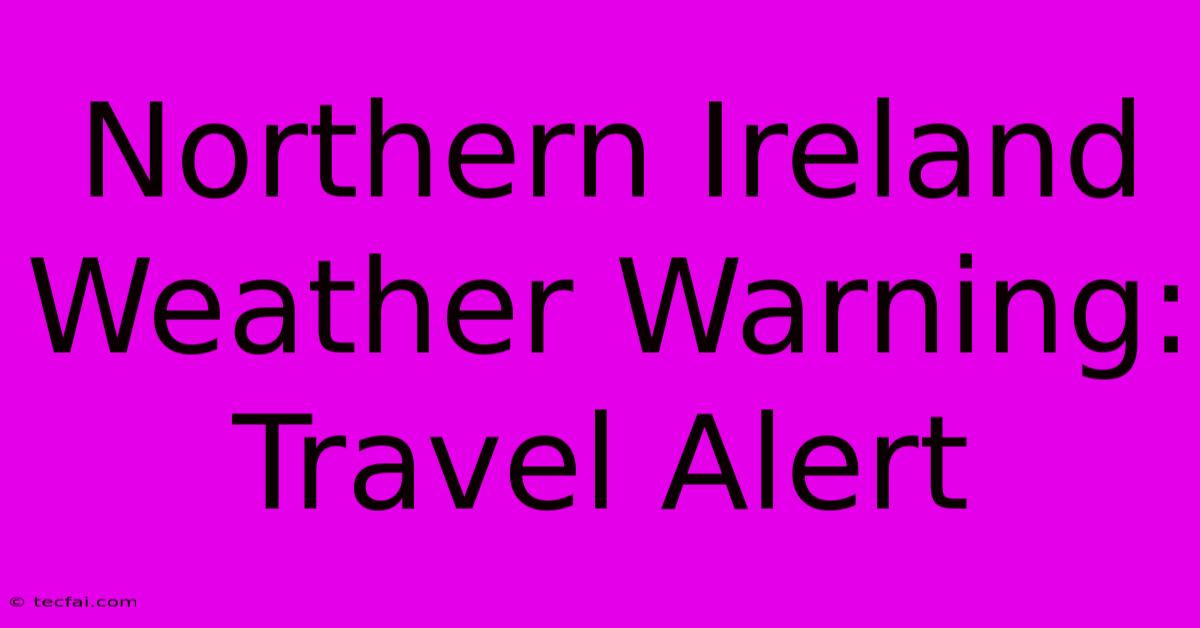Northern Ireland Weather Warning: Travel Alert

Discover more detailed and exciting information on our website. Click the link below to start your adventure: Visit Best Website tecfai.com. Don't miss out!
Table of Contents
Northern Ireland Weather Warning: Travel Alert
Northern Ireland's famously unpredictable weather can quickly turn hazardous, prompting important travel alerts and safety precautions. This article provides crucial information for anyone planning to travel to or within Northern Ireland, particularly during periods of adverse weather. We'll cover the types of warnings issued, how to stay informed, and essential steps to ensure a safe journey.
Understanding Met Office Warnings for Northern Ireland
The UK Met Office is the primary source for weather warnings in Northern Ireland. They issue alerts based on the severity and potential impact of various weather phenomena. These warnings aren't just about inconvenience; they're about safety. Understanding the warning levels is crucial:
-
Yellow Warning: Be aware. Potentially disruptive weather is expected. Plan ahead and monitor forecasts regularly. This might include strong winds, heavy rain, or snow. While travel is still possible, delays and disruptions are likely.
-
Amber Warning: Be prepared. Significant disruption is likely. Following the advice given in the warning is essential. This level suggests that weather conditions pose a serious threat, possibly impacting travel severely. Only essential travel should be undertaken.
-
Red Warning: Take action. Severe weather is expected with a high impact. Follow the advice given immediately. This is the most serious warning, indicating life-threatening conditions. Travel should be avoided entirely unless absolutely essential.
What Weather Phenomena Trigger Warnings?
Warnings are issued for a variety of severe weather conditions, including:
- Strong winds: Capable of causing damage to buildings, trees, and power lines, and making driving conditions hazardous.
- Heavy rain: Leading to flooding, disruption to transport networks, and potential landslides.
- Snow and ice: Creating treacherous driving conditions and posing a risk of slips and falls.
- Thunderstorms: Bringing the risk of hail, lightning strikes, and localized flooding.
- Fog: Reducing visibility significantly and creating hazardous driving conditions.
Staying Informed About Weather Warnings
Staying updated is paramount. Here's how you can keep abreast of weather warnings for Northern Ireland:
-
Met Office Website: The official source for accurate and up-to-date weather information. Check their website regularly, particularly before any planned journey. They provide detailed forecasts and warnings specific to different regions of Northern Ireland.
-
Met Office App: Download the Met Office app for real-time alerts directly to your phone. This provides instant notifications for your area, ensuring you are always informed about developing weather situations.
-
News Media: Reputable news outlets in Northern Ireland regularly report on weather warnings and their potential impact.
-
Local Radio: Local radio stations often provide frequent updates on the weather and travel conditions.
Safe Travel During Weather Warnings
When a weather warning is in place, prioritize safety:
- Check your route: Before you travel, check for road closures or disruptions on the TrafficwatchNI website.
- Drive carefully: Reduce your speed, increase following distances, and be extra vigilant.
- Pack appropriately: If travelling during adverse weather, ensure you have appropriate clothing and supplies in case of delays.
- Charge your phone: Ensure your mobile phone is fully charged before you travel.
- Let someone know: Inform someone of your travel plans and estimated arrival time.
- Be aware of your surroundings: Pay attention to signage and heed warnings from emergency services.
- Avoid unnecessary travel: During Red warnings, avoid all but absolutely essential travel.
Conclusion
Staying informed about weather warnings and taking appropriate precautions is crucial for safe travel in Northern Ireland. By utilizing the resources available and exercising caution, you can significantly reduce risks associated with adverse weather conditions. Remember, safety should always be the top priority when travelling in any weather conditions. Plan ahead, stay informed, and stay safe.

Thank you for visiting our website wich cover about Northern Ireland Weather Warning: Travel Alert. We hope the information provided has been useful to you. Feel free to contact us if you have any questions or need further assistance. See you next time and dont miss to bookmark.
Featured Posts
-
Derby County Vs Swansea City Live
Nov 28, 2024
-
Post Ceasefire Lebanon Returns Home
Nov 28, 2024
-
Celtics Brugge Ucl Draw Player Performances
Nov 28, 2024
-
Vikings Sign Former Giants Qb Jones
Nov 28, 2024
-
Champions League Liverpool Secures Win
Nov 28, 2024
